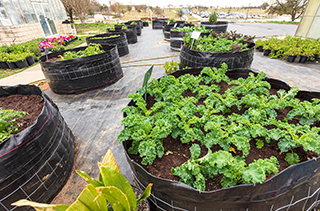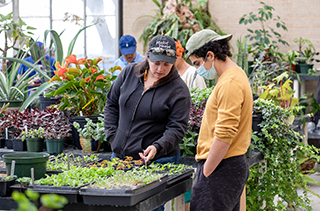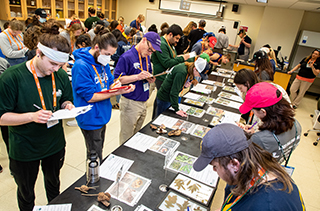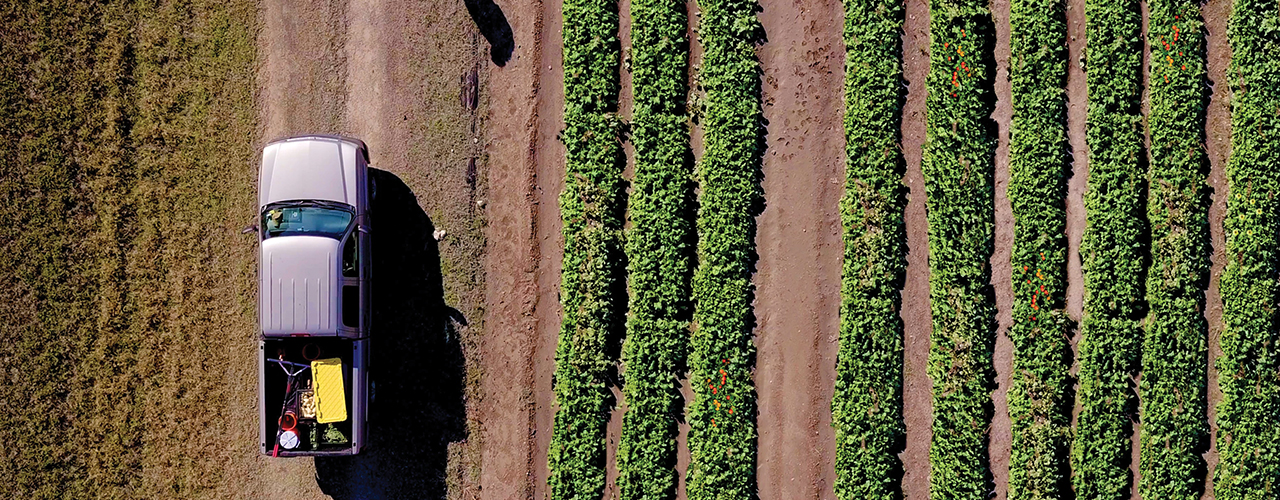Growing Stronger
TCC's horticulture program is planting seeds that will provide a harvest for years to come
Much like artemisia ludoviciana (prairie sage), TCC’s Horticulture program remains resilient in spite of the challenges students faced learning through a pandemic. Founded in 1976, the comprehensive program is the only one of its kind in the metroplex and offers students the skills and opportunities on which to build their career.
Planting Seeds
As TCC pivoted to online learning in Spring 2020, the Horticulture program was able to offer hybrid classes—a mix of virtual and in-person learning. While things may have been hard at first, the Horticulture program managed to blossom throughout the pandemic, even doubling enrollment numbers since stay-at-home orders began.
David Cole, learning lab manager and adjunct horticulture instructor, was just happy to be with people during a time with so much social isolation. “It’s not the most glamorous job, but we’re just so glad to get out of the house and get our hands dirty in a setting that’s fun and educational,” said Cole.
 Since the students were unable to take part in community projects like they would
during a typical semester, they took to projects in their own backyard on TCC Northwest.
Since the students were unable to take part in community projects like they would
during a typical semester, they took to projects in their own backyard on TCC Northwest.
The students worked not only in the greenhouses and outdoor gardens, but also in the pollinator garden. Pollinators are critical to our ecosystem, ensuring the healthy harvest of crops and plants that feed the world.
Students also participated in the upkeep on the Prairie Restoration Project, working to identify various flowers and plants, as well as remove invasive species which pose a threat to native Texas plants.
All this work is part of the Horticulture department’s “learning by doing” method: students learn how to care for plants because they are the ones in the greenhouse day after day. They also prepare themselves for careers in landscape irrigation, for example, by laying irrigation pipe.
“Horticulture is managing the outdoors, and our students are doing just that,” said Cole.
Spreading Leaves
With TCC returning to in-person classes in Fall 2021, the Horticulture program was able to start reconnecting not only with each other, but also the community.
The Horticulture Club, open to any TCC student, held weekly outdoor meetings to work on service projects, like the annual plant sale. TCC held this year’s plant sale in April after having to cancel the last two years due to the pandemic.
For the sale, they grow everything from annual flowers to vegetables and herbs, all perfect for the home gardener.
The club is also learning about plants indigenous to Texas from instructional associate Bill Freiheit. Club members get hands-on experience propagating many rare, native plants that are critical to the local ecosystem and support eco-sustainability.
 Cole and his students also are excited about a new collaboration with Grow Southeast
(coactntx.org/grow-se), a joint community development initiative formed by CoAct,
the Healthy Tarrant County Collaboration and the Office of Commissioner Roy Charles
Brooks, to incubate locally owned urban farms to combat food insecurity.
Cole and his students also are excited about a new collaboration with Grow Southeast
(coactntx.org/grow-se), a joint community development initiative formed by CoAct,
the Healthy Tarrant County Collaboration and the Office of Commissioner Roy Charles
Brooks, to incubate locally owned urban farms to combat food insecurity.
“Their goal is to not only empower people to start their own farm business and potentially make a living, but also provide fresh, healthy produce to people in those communities,” said Cole.
According to the USDA, many of the neighborhoods in Southeast Fort Worth are classified as a “food desert,” meaning that there is a serious lack of affordable and quality food. Grow Southeast supports urban farmers to meet that demand for fresh, healthy food.
“Urban farms are the foundation for a resilient food system,” said Jesse Herrera, a former TCC employee and founder and executive director of one of Grow Southeast’s partner organizations, CoAct. “Without farms, it is difficult to develop any of the other supporting markets including farmers markets, food hubs, niche restaurants and local delivery options.”
TCC students are growing plant seedlings to provide to the urban farms, which will then grow them to harvest. Herrera hopes the collaboration not only strengthens the community, but also students’ passion for farming.
“For us, we imagine a future where the narrative is different, and farming is embraced as a relevant and profitable career choice that is celebrated,” said Herrera.
Blooming Bright
The future is flourishing for TCC’s Horticulture students. After a stellar performance at the 2019 National Collegiate Landscape Competition, TCC returned for the 2022 competition in March; TCC student Paul Preston placed 14th out of more than 500 students. Students competed in events like flower and foliage identification, landscape lighting and exterior landscape design.
“It might seem a little intimidating that we are a two-year school competing against four-year schools, but we actually beat some of the four-year schools,” said Bulpitt. He credits TCC’s hands-on curriculum for preparing students to test their trade and career skills.

TCC student Clay Holsworth hopes to own his own greenhouse company one day, and his education from TCC’s Horticulture program will help make that a reality. Holsworth is working on an Associate of Applied Science in Horticulture and plans to transfer to Texas A&M upon graduation from TCC.
“I would like to see more programs exactly like this one, and more teachers like the ones I have who are so knowledgeable and sincere,” said Holsworth. “It allows for more people with plant knowledge to go out into the world and make a difference.”
Visit TCC’s Horticulture program for more information.

